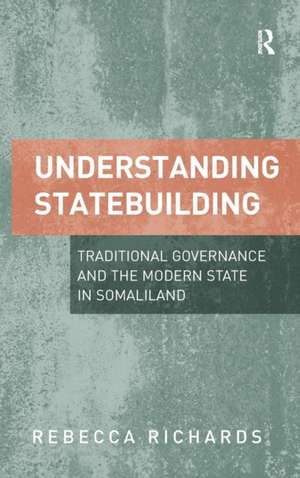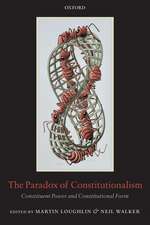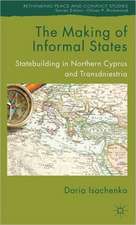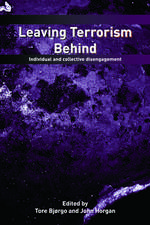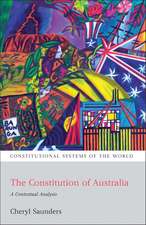Understanding Statebuilding: Traditional Governance and the Modern State in Somaliland
Autor Rebecca Richardsen Limba Engleză Hardback – 28 iul 2014
| Toate formatele și edițiile | Preț | Express |
|---|---|---|
| Paperback (1) | 469.34 lei 6-8 săpt. | |
| Taylor & Francis – 23 noi 2016 | 469.34 lei 6-8 săpt. | |
| Hardback (1) | 1001.87 lei 6-8 săpt. | |
| Taylor & Francis – 28 iul 2014 | 1001.87 lei 6-8 săpt. |
Preț: 1001.87 lei
Preț vechi: 1221.79 lei
-18% Nou
Puncte Express: 1503
Preț estimativ în valută:
191.70€ • 200.69$ • 158.63£
191.70€ • 200.69$ • 158.63£
Carte tipărită la comandă
Livrare economică 05-19 aprilie
Preluare comenzi: 021 569.72.76
Specificații
ISBN-13: 9781472425898
ISBN-10: 1472425898
Pagini: 228
Ilustrații: black & white illustrations
Dimensiuni: 156 x 234 x 14 mm
Greutate: 0.5 kg
Ediția:New ed
Editura: Taylor & Francis
Colecția Routledge
Locul publicării:Oxford, United Kingdom
ISBN-10: 1472425898
Pagini: 228
Ilustrații: black & white illustrations
Dimensiuni: 156 x 234 x 14 mm
Greutate: 0.5 kg
Ediția:New ed
Editura: Taylor & Francis
Colecția Routledge
Locul publicării:Oxford, United Kingdom
Notă biografică
Rebecca Richards earned her PhD in International Relations from the University of Bristol in 2009. She has lectured at the University of Bristol, the University of the West of England, the University of East Anglia and the University of Lancaster. Her work focuses on statebuilding in Somaliland, specifically focusing on the utilization of the clan and traditional authority in post-conflict stabilization in the territory and in the facilitation and stabilization of the statebuilding process. She also works more broadly on critical interpretations of statebuilding, unrecognized states, and state failure.
Recenzii
’This book provides a wide-ranging and accessible analysis of contemporary state-building in Somaliland. The institutional and democratic gains that have been made are all the more noteworthy because they have been secured without international support or recognition. While invaluable to the area specialist, because of its challenge to conventional wisdom, the book is highly recommended for students and scholars of state-building more generally.’ Mark Duffield, University of Bristol, UK ’This book provides a theoretically sophisticated and empirically rich answer to the question how did Somaliland do it? Its fascinating and original exploration of hybrid government, and the ways in which Somaliland reconciled domestic needs and external demands, makes it a must-read for anyone interested not only in unrecognised states but also in state-building and state formation more generally.’ Nina Caspersen, University of York, UK '... valuable for theoretical and regional specialists alike, showing a side the region often unseen and bridging the gap in literature between the traditional and the modern, much like what is happening on the ground in Somaliland.' African Studies Quarterly
Cuprins
Chapter 1 Introduction; Chapter 2 Norms, Ideals and Modern Statebuilding; Chapter 3 Legitimacy and the ‘Built’ State; Chapter 4 The Clan, Governance and the Build-up to Breakdown; Chapter 5 The Emergence of the New State; Chapter 6 The Institutionalisation of the Traditional; Chapter 7 Somaliland at the Crossroads?; Chapter 8 Conclusions;
Descriere
Much analysis of state building focusses on dissecting specific projects and attempting to identify what has gone ’wrong’ in states such as Afghanistan and Iraq. What draws less attention is what has gone ’right’ in non-interventionist statebuilding projects within 'unrecognised’ states. By examining this model in more depth a more successful model of statebuilding emerges in which the end goal of modern democracy and good governance are more likely to be realized. Indeed 'states-within-states’ such as Somaliland where external intervention in the statebuilding process is largely absent can provide vital new lessons.
